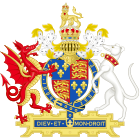

| Act of Parliament | |

| |
| Long title | An Act for the punishment of Vagabonds, and for the Relief of the poor and impotent Persons. |
|---|---|
| Citation | 1 Edw. 6. c. 3 |
| Territorial extent | |
| Dates | |
| Royal assent | 24 December 1547 |
| Text of statute as originally enacted | |
The Vagabonds Act 1547 (1 Edw. 6. c. 3), also known as the Vagrancy Act 1547, was a statute passed in England by King Edward VI and his Lord Protector, Edward Seymour.[1] It provided that vagabonds could be enslaved for two years and continued weekly parish collections for the poor.[2] The enslaved vagabonds were to be fed bread and water or small drink and were allowed to be worked by beating, chaining, or other methods the master may choose. Vagabond slaves were allowed to be bought and sold just as other slaves. Also, should no private man want the vagabond slave, the slave was to be sent to their town of birth and be forced to work as a slave for that community.[3] Vagabond children could be claimed as "apprentices" and be held as such until the age of 24 if a boy, or the age of 20 if a girl. Should they attempt to escape this apprenticeship, they were subject to enslavement for the remainder of the apprenticeship.[3]
According to historian Mark Rathbone, "there is no evidence that the Act was enforced."[4] The Vagabonds Act 1549 makes a reference to the limited enforcement of the punishments established by the Vagabonds Act 1547 by stating "the extremity of some [of the laws] have been occasion that they have not been put into use."[4]
The Vagabond Act 1547 proved to be impractical to implement. The Tudor Vagabond Acts had an emphasis on punishments for the impotent poor. The English Poor Laws, that followed, built on the Tudor acts to provide a comprehensive system for poor relief, that was paid for by a system of compulsory taxation.[5]
|
Poor laws of the British Isles
| ||
|---|---|---|
| Poor laws by territory |
| |
| Old Poor Law |
| |
| Relief systems |
| |
| New Poor Law |
| |
| Changes after 1834 |
| |
| Decline and abolition |
| |
| Other |
| |